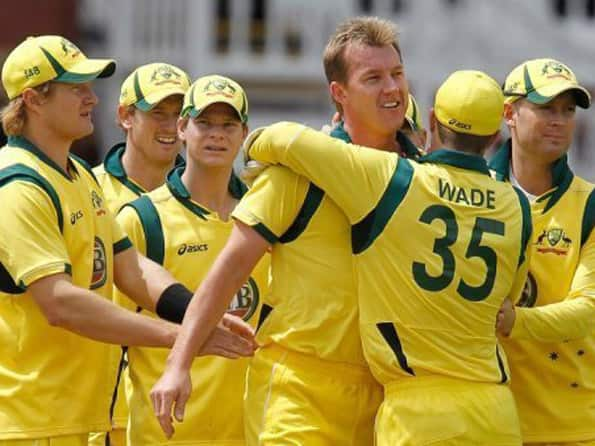
Cricket Country Staff
Editorial team of CricketCountry.
Australia's Brett Lee and Shane Watson both had their tour of England cut short by calf problems on Monday as they were ruled out of Tuesday's fifth one-day international at Old Trafford.
Written by Cricket Country Staff
Published: Jul 09, 2012, 07:33 PM (IST)
Edited: Jul 09, 2012, 07:33 PM (IST)


Shane Watson and Brett Lee (in picture) reportedly have calf strains © AFP
Manchester: Jul 9, 2012
Australia’s Brett Lee and Shane Watson both had their tour of England cut short by calf problems on Monday as they were ruled out of Tuesday’s fifth one-day international at Old Trafford.
The duo, who suffered their injuries while bowling during a crushing eight-wicket defeat at Chester-le-Street on Saturday that gave England a series-clinching 3-0 lead in the five-match contest, are now due to fly home to Australia later Monday.
Australia team doctor John Orchard said in a statement: “Shane Watson and Brett Lee have calf strains — Shane to the left and Brett to the right calf — sustained during the fourth ODI against England at Durham.
“This is the opposite calf to the injury Shane had last summer. Because both players will miss the final game, they are flying back to Sydney for MRI scans and further treatment.
“At this stage, they are anticipated to be available for consideration for selection for the ICC World Twenty20 (in Sri Lanka starting in September), with scan results and response to treatment to determine whether they will be available for consideration for selection for the coming series against Pakistan in the UAE (United Arab Emirates).”
Fast bowler Lee and seam-bowling all-rounder Watson joined teenage paceman Pat Cummins (side strain) in returning home early from the tour.
Meanwhile, left-arm quick Mitchell Johnson did not play in Chester-le-Street because of soreness in his right foot.
Lee and Watson’s injuries saw Australia bring another left-arm quick in Mitchell Starc, who had been playing for English county Yorkshire, into their squad as cover on Sunday. (AFP)
This website uses cookies so that we can provide you with the best user experience possible. Cookie information is stored in your browser and performs functions such as recognising you when you return to our website and helping our team to understand which sections of the website you find most interesting and useful.
Strictly Necessary Cookie should be enabled at all times so that we can save your preferences for cookie settings.
If you disable this cookie, we will not be able to save your preferences. This means that every time you visit this website you will need to enable or disable cookies again.
